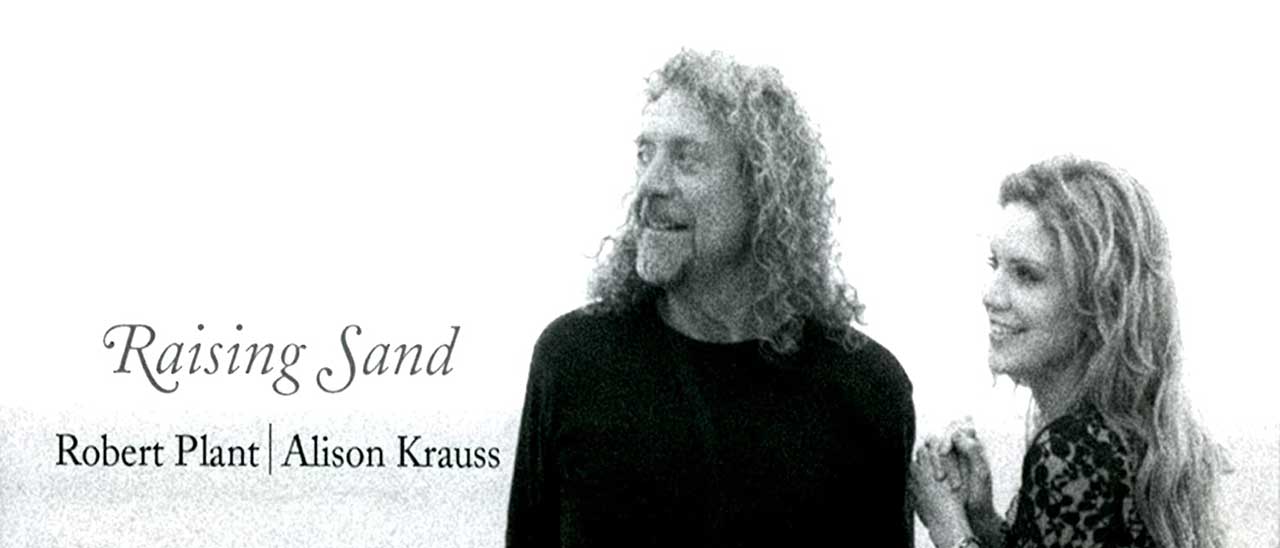You can trust Louder
While the world goes giddy at the prospect of Robert Plant taking centre stage once again with Led Zeppelin to exhort the hordes of lucky ticket lottery winners to squeeze his lemon, Plant releases an album that some would say more agreeably befits a man of his considerable experience.
Teaming up with Alison Krauss, the delightful bluegrass singer and fiddle player from Illinois, and producer T Bone Burnett, Plant goes back to a few roots, teasing out the nerves of some wonderful if obscure American country, folk and blues songs of all ages and resurrecting them in thoughtful, fresh surroundings.
As a result, Raising Sand is devoid of cliché. The Everly Brothers’ Gone Gone Gone (Done Moved On), performed with a primitive, backyard modesty that resists any temptation to show off, shows respect and affection for early rock’n’roll. The same is true of Plant’s vocals, which across the album are usually subtle, understated, tailored to the arrangements and to Krauss’s singing rather than to his reputation for champion-league wailing
He’s commendably subdued in his solo rendition of Townes Van Zandt’s Nothin’, his voice attuned to a strangely oppressive atmosphere in which Krauss’s violin labours under the weight of some terribly heavy load. And far from hogging the limelight on Gene Clark’s Through the Morning, Through The Night, a stately country and western waltz, Plant hands the leading lines to a melodious Krauss.
Only once, towards the end of the tuneful Plant/Page co-write Please Read The Letter (a reworking of the track from 1998’s Walking Into Clarksdale), does he resort to the famous moan, but it’s not a full-blown melodrama. Krauss sings with a sweet, sometimes ethereal beauty, with a bluesy edge on the solo outing Let Your Loss Be Your Lesson, and with a purity that interacts surprisingly well with Plant’s mature counterpart.
They share things democratically, sometimes joining forces and sometimes performing whole songs, or parts of them, alone, and seem to revel in the collaboration. Nowhere is this more affecting than in Killing The Blues and Stick With Me Baby, gentle, pretty offerings sung in harmony and with the utmost sensitivity. Plant’s breathy restraint gives foundation to the delicacy of Krauss in Killing The Blues, a country ballad with chiming pedal steel and a remarkably unhurried pace. Stick With Me Baby ambles along with a slight swing and a matching, muted, whispery delivery from the partners.
Generally, this is not an up-tempo collection. Gone Gone Gone (Done Moved On) has a lively, light-hearted feel and Let Your Loss Be Your Lesson is based on country rock, but elsewhere the focus is on interpretation and innovation rather than velocity. Polly Come Home, another Gene Clark cover, is sparse and beautifully hypnotic, with Plant’s lead vocals murmuring and drifting over the enormous spaces between booming drum beats and lazy guitar licks, while Krauss adds a dreamy presence, audibly drawing breath between her lines.
Sign up below to get the latest from Classic Rock, plus exclusive special offers, direct to your inbox!
There’s something of the same atmospheric ambition about the pacier Rich Woman, on which the dual vocals sail along on a sea of shimmering guitar. Sister Rosetta Goes Before Us serves as a showcase for Krauss, with Plant content to croon ‘aah’s in the background as mandolins flutter and fiddles dance around Krauss’s swooping performance, her most intimate on the album. The foundation of the song is the sort of jarring, toytown clippety-clop beloved of, say, Tom Waits, and indeed Waits is represented here with Trampled Rose. Again it’s a lone Krauss vocal, reaching up high for notes and sounds to match the spooky atmospherics of the instruments.
Plant and Krauss are together again in harmony for Your Long Journey, a jangling, folksy song of love, death and parting – an appropriate if slightly morbid conclusion to the album. As Zeppelin take their place as rock’s biggest band, Plant should be equally as proud of what he has achieved here.
The review was originally published in Classic Rock 112, in September 2007.
Carol Clerk wrote extensively for Melody Maker in the 80s and 90s, and then for Uncut and Classic Rock. In 1985 she won a journalist of the year award from the Professional Publishers Association for her coverage of the Live Aid concert at Wembley. She ghostwrote gangster Reggie Kray's autobiography and was the author of books about Madonna, the Pogues, Hawkind and others, as well as Vintage Tattoos: The Book of Old-School Skin Art. She died in March 2010.


